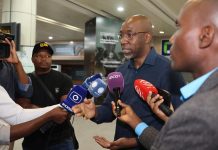Africa-Press – Mozambique. In this issue
News
Cabo Delgado
Covid-19 explosion
There were 1139 new Covid-19 cases on Saturday 3 July, the highest since 3 February. And growth in new cases is exponential, doubling every week. As predicted, the third wave looks to be worse than the second wave in January. There were 28 deaths last week, compared to 19 the week before and 10 the week before that.
Most cases have been detected in Maputo city and province, with 60% of active cases, but there has been a major outbreak in Tete with 22% of active cases. The other important outbreak is in Sofala, with 7% of active cases.
Daily new cases since December. Chart by Miguel de Brito
The Speaker of parliament tested positive for the coronavirus that causes Covid-19. The test on Friday was part of her preparations for a visit abroad. She is showing no symptoms, and is in home isolation. Over the past week, Bias made working visits to Cabo Delgado and Nampula. On Wednesday she was in Pemba and on Thursday, she visited the Corrane camp in Meconta, Nampula province, which is accommodating about 4,000 displaced people.
Standard Bank banned from all forex dealings
Standard Bank of South Africa, one of the most important banks in Mozambique, has been hit with heavy restrictions by the Bank of Mozambique (BdM). So far no reasons have been given, but Bloomberg (24 June) reported that Standard is accused of manipulating the foreign exchange market. BdM has banned the bank for “carrying out all activities involving the conversion of foreign currency on the foreign exchange market.” In addition, BdM has begun legal actions against the bank and two top officials, who have been suspended. They are CEO Chuma Nwokocha and the head of the corporate department, Carlos Madeira. The bank’s chief financial officer, Gomezgani Neba, has taken over as interim chief executive.
Standard Bank is said to control 46% of the foreign exchange (forex) market and it is used by the local elite as well as embassy staff and aid agencies. Various media report that some customers of Standard Bank have been unable to withdraw money from payments made to them in US dollars or convert them to meticais. Carta de Mocambique reports that customers expecting transfers from abroad have not seen them reflected in their accounts, and that they have not been able to move their deposits to other banks.
Chair of the Standard Mozambique board is Tomaz Salomão, former finance minister and a member of Frelimo’s ruling political commission.
At issue is the huge jump in the value of the Metical in mid-April. The metical increased in value by 13% in a week, from $1 = MT 65.5 on 6 April to $1 = MT 56.8 on 14 April. Then it was kept at precisely that level for two weeks. (See this newsletter 544 and the graph below).
The Metical has returned to 63.5 and is expected to hit 75 before the end of the year. Nothing in the economy would have caused such a rapid change, and market manipulation has been suspected.
Who would have profited? Start with $1000. Sell on 6 April for 65,500 meticais. Use those to buy $1153 on 14 April. Sell those dollars today to receive 73,225 meticais. A tidy profit in four months, if you had inside knowledge. Standard Bank has huge dollar deposits, and various importers could make money on such sharp fluctuations.
Other news
32 people were killed in a bus crash on the N1 in Zavala, Inhambane,
on Saturday 3 July. The bus from Beira to Maputo attempted to overtake a truck carrying construction sand, at a point in the road where it is clearly marked that no overtaking is permitted. The bus smashed head on with an articulated lorry travelling in the opposite direction. In a desperate attempt to return to the correct lane, the bus also hit the truck it had been overtaking. There was only one driver on the bus and it is a 16 hour drive from Beira to Zavala. Witnesses at the scene reporting that the bus was driving at high speed and with poor headlights.
The bus company Nhancale has a terrible record on the same N1 in Inhambane.
On 17 December 2016 a Nhancale bus was involved in an accident in Maxixe; one person died, and 48 others were injured. The bus driver fled from the scene of the accident. On 3 September 2017 in Quissico, a Nhancale bus overturned and caught fire, after one of its tyres burst, killing 12 passengers. And just two days before, on 30 June this year, a Nhancale bus caught fire as it was driving on the N1 near Bilene, Gaza; all passengers escaped.
Serious pro-democracy protests in Swaziland (eSwatini) have been going on since late June,
with violent confrontations between demonstrators and the police and army. The blog Swazi Media claims 19 people have been killed. Swaziland is Africa’s only absolute monarchy and political parties are banned. Mswati III has been the king since 1986. There are unconfirmed reports that he fled on 28 June, perhaps to neighbouring Mozambique.
Cabo Delgado
1 July was the 51st anniversary of the start of Operation Gordian Knot, the failed operation by colonial Portugal to defeat Frelimo. It was based on the belief that a foreign military intervention could beat a guerrilla force in a civil war in Cabo Delgado. Just a month after its start, on 6 August 1970, General Kaulza de Arriaga declared victory. But it proved a complete failure which eventually led to the military overthrowing the Portuguese government in 1974 and the victory of Frelimo and independence in Mozambique.
In June 1969, Arriaga became commander of he Portuguese forces in Mozambique and in March 1970 became commander in chief of the Portuguese armed forces. He entered with a plan for a big military operation to defeat Frelimo once and for all – to use 8000 troops to cut the Gordian Knot. In 1973 he was refused resources to step up the failed military campaign and was dismissed.
Mariana Carneiro has a long and excellent article (unfortunately only in Portuguese, “1 de julho de 1970: Inicio da Operacao No Gordio”) on Esquerda (1 July). She is careful simply to tell the story. But the similarities with the current war jump out at the reader.
In May 1970, following the assassination for Eduardo Mondlane, Samora Machel, already military commander, became president of Frelimo. He changed tactics, notably dispersing units into smaller groups, resulting in greater mobility on the ground and the capacity for surgical attacks on the Portuguese detachments.
As today, the military faced splits and conflicts with interests in the government and economic sector. First Arriaga had to confront the governors-general, including Baltazar Rebelo de Sousa (father of the current President of Portugal), who did not agree with his plan for the conduct of the war. And he had to deal with Jorge Jardim, the businessman who pulled all the strings in Mozambique. He mediated the interests of large multinationals and of white-ruled neighbours Rhodesia and South Africa, was linked to the Portuguese secret service PIDE, and also helped fund the armed forces.
And as today, Arriaga put his stress on creating special commando and air units (mainly of Mozambicans) and of clearing the population into “strategic villages” to keep people away from Frelimo. This is the strategy today. Portugal and US are training special forces. New helicopter forces are already in operation, supplied and crews trained by foreign private military companies. And it is obviously government policy to clear the land to keep local people away from the insurgents, with nearly the entire population moved outside the war zone as “internally displaced people”.
Arriaga chose Mueda as his military operations base, as the government has today. Frelimo was concentrated in what are now Muidumbe and Macomia districts. On 25 and 29 March, in Litapata, Muidumbe district, Machel issued new orientations to the guerrillas. Recognising the military superiority of the enemy in almost every respect, he said the guerrillas should adopt a tactic of attacking and withdrawing immediately. Frelimo abandoned its three large bases, which were taken by Ariaga. Frelimo created smaller units and intensified sabotage and hit and run actions. And it moved into new areas in Niassa and Tete.
The Portuguese leadership of the time later admitted the error of trying to apply the tactics of classic warfare to subversive warfare. Silva Cunha, minister of Overseas Territories (1965-1973) and then Defence (1973-1974) said “it was like throwing a stone at a hornet’s nest: the wasps flew everywhere. The result was that subversion expanded instead of being subdued.”
After Gordian Knot, Arriaga intensified violence against the people, including Operation Frontier, which destroyed peasant crops with herbicides. This only shifted them to support Frelimo.
Is history repeating itself? Is the government following Arriaga’s strategy? Will the desperate attempt to bring in foreign military forces be Frelimo’s Operation Gordian Knot?
“Mozambique is the latest victim of this resource curse – with one, extraordinary, difference: it happened before a single dollar of gas revenues was generated,” reports Business Live. And it blames “the transformation of Mozambique’s developmental elites into anti-developmental rent- seekers.”
A harsh and pessimistic view comes from the voice of South African business. BusinessLive is the online presence of Business Day and the Financial Mail. All are owned by Arena, and speak for South African capital. BusinessLive ran a four part series (28 June – 1 July), written by South African management consultants Eunomix. The four articles are pulled together in a single file on https://bit.ly/BusL-Moz
“Three years of hapless governance and mindless repression turned an insurgency rooted in local grievance and rights into an Islamic State-affiliated organisation controlling the destiny of Mozambique, revealing the tragic gamble that was Frelimo’s plan. It has failed, and with or without foreign military assistance, the situation can only worsen.
“To get the country away from failed state status will require that the decline of economic and political governance, and the related issue of the domestic origins of the insurgency and its escalation, be addressed. Frelimo, opting for the rewards of illiberal rule, will not be an easy partner, showing until now scant regard for either. But both party and government are running out of options.
‘Frelimo is consumed by infighting over spoils and factional manoeuvring to succeed President Filipe Nyusi, who is serving his final term. A party previously known for discipline and strategic choice has never been so directionless,” writes Douglas Mason in the third article.
“A decade ago, Mozambique was a poster child for the African Renaissance. … Instead, Mozambique snatched defeat from the jaws of victory and is now fast approaching failed-state status,” warns Eunomix in the final article. It says all scores for governance, security, and fragility have fallen in the past decade, and especially in the past five years.
“What started with misrule must be corrected through the end of misrule. Return to non-fragility can only originate from politics. This places Frelimo and the country’s elites front and centre of resolution.”
“The international community, investors and the [oil and gas] majors may either contribute to making the crisis worse or use their considerable leverage towards sustainable resolution. To do the latter they must resist piecemeal interventions, military and economic, that play into the elite’s power calculus. There is no evidence that the Southern African Development Community intervention will avoid this pitfall.”
“There are no technical solutions to political problems. Only political solutions.”
Claude de Baissac in the first article gives two option as to how to move forward. “The optimal solution would be a slow and largely by-the-book approach to rebuilding the security forces while rolling out whole-of-government measures … designed to remedy various socioeconomic ills, foster development in Mozambique and otherwise defuse the conflicts that feed the insurgency.
“The second would be a more focused security-centred approach intended initially to carve out around Palma the kind of security Total would require to resume work [which] has a few practical advantages. Clearing and holding a perimeter militarily speaking may be a more attainable
objective for security forces that are as broken as Mozambique’s. … The danger is that the revenue flow might serve to worsen the crisis. Just enough natural gas riches is likely to embolden the governing elite. Absent meaningful reforms, increased fiscal resources from Cabo Delgado may only intensify elite predation and abuses, as such programmes would be implemented through state channels that are corrupt, ineffective and part of a state presence that is tainted in the eyes of the local population.”
By
Joseph Hanlon






